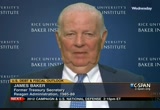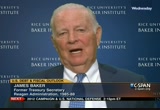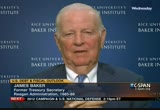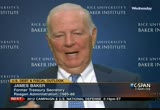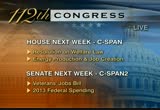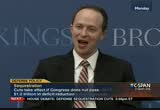tv Washington This Week CSPAN September 15, 2012 2:00pm-3:51pm EDT
2:00 pm
most attention has been focused on removing tax expenditures on the personal side. it does seem to me that maybe we have a better shot of reforming the corporate side. everybody is talking about reducing the corporate rate. i do not know how you do that without getting rid some of these subsidies. that seems to me a good place to start paying bank >> i agree with that. i do think you can broaden and lower the rate. if that is going to be deficit- neutral, it is not contributing to any thing to deal with our fiscal problem. >> as long as it removes the inefficiencies of the system. >> i think that is fine. i totally agree with you. it does not do anything to address the issue that we were
2:01 pm
convened here today. >> cried do not have any questions. >> that is the person i've ever seen that. you have just made history. >> bob talks about the political system the problems are not rocketdyne is resolved. this is not quite finding a cure for cancer. we kind of all know what to do. the question is, will our
2:02 pm
political system evolves to the point that allows us to make these difficult, tough decisions? you know what leadership requires and what team work requires. i guess my question to you, and maybe it is self evident is, what are the incentives for it leaders to act like leaders? we present the problems and their catastrophic. that is what fiscal leadership is for. if you were advising the next president of the united states, and i'd think you kind of alluded to this. i think the president has to take the lead on this and set the direction, as most ceo's do. what do we have to do to get the leaders to act in an affirmative an assertive way?
2:03 pm
>> i think i may have said it, dan. you simply have to continue to hammer home the potential consequences of inaction. and they are catastrophic. i do not think -- my sense is that regardless of how our election turns out for president. the new chief executive is going to want to find a way, if he can, to deal with this problem. and i am pessimistic only if we continue to have divided government. if we do not have that, then we have a real opportunity to get something done. and i would hope that we have it even if we have divided congress. that remains to be seen. >> i do think the next
2:04 pm
president, if this problem is not solved, the next president will have four fallow years. call former distinguished senator said that when he was there years ago, they got together and somehow they've got to establish with the incentives are. maybe it is deciding what is here. and finally, and jim alluded to this and would be far more expert than i would be -- if enough political pressure can be created, it may create political calculus for those in office to cooperate or they might not be in office much longer. imports -- >> excuse me, jim.
2:05 pm
i was just going to say, sam, i think one of the speaker's earlier, i think the former congressman from tennessee, referred to the supreme court decision in baker's as car -- baker vs. car and talked about the redistricting process that we have in this country exacerbating the problem because of political dysfunction. our campaigns now revolve around the primaries and not the general election. if we do not have any truly competitive seats anymore. you cannot correct that without a constitutional amendment, which is ordinarily tough to get. >> david johnson, louisiana. >> if it is a disaster to go off of the fiscal cliff, and if --
2:06 pm
and i think we all agree that is, then what do we do in the lame duck? that is the emergency now. do you all agree with me that we can accomplish two things? first, get a goal of deficit reduction. $43 million is what sims and- bolts has over nine or 10 years. bowles son -- simpson- has over 910 years. and if you do not act by a certain date, then certain things happen. do you agree with me on that? i think we need to focus on that lame-duck session. >> thank you.
2:07 pm
jim and then bob. >> let me tell you what i think is going to happen, bennett. i think there will be a much greater focus on this problem right after the election. there will not be time during the lame duck to get anything substantively done about it, but there will be a recognition that we have to move the cliff out so that we have time to deal with it and deal with it in an orderly and effective way. i think that is what is going to happen. >> i have given a lot of thought into it and i even wrote an op- ed on it for the "wall street journal" not too long ago. one approach at least would be to defer the year and for a couple of months. -- the year-end for a couple of
2:08 pm
months. there is still the pressure of the fiscal cliff. you are just deferring it for two months. i am not so sure we will not go over the fiscal clift briefly, because it may be that for all kinds of reasons one party might decide that is the way to negotiate and the way we need to go. we cannot tell for sure. thirdly, i think the idea of doing something general and then deferring its completion get to be troubling to me. you know far more about the legislation that i do. and you get further down the road and you're the next election and for their way from the last election and i have a feeling that congress in its infinite wisdom, or lack thereof, would be inclined to postpone things indefinitely. you've got to put something in place, not every piece of it. it cannot be 30,000 feet in the air. bareass to be a lot of
2:09 pm
specificity to it. one should consider -- i'm not sure it is the right idea, but i kind of think is -- to defer it to the end of the year to a couple of months -- for a couple of months. >> to both jim and to bob oconomowoc -- to both jim and to bob, you have outlined articulately and eloquently your economic credentials and expertise here. what are you more worried about right now? the economic fundamentals or part of the political dysfunction up on capitol hill? and to the political dysfunction and gridlock, how do we talk about the answers to the fiscal cliff and to the deficit in optimistic and positive ways -- a job growth, economic competitiveness, things that will get the legislators'
2:10 pm
attention that will be rewarding to them, and hopefully increase the cascade of both pressure and also optimism and opportunity for them? >> jim? >> that is going to be part of the debate. it seems to me, tim. in my remarks, i outlined for you -- you know, bob and i will probably disagree on some of these issues. in fact, we do, and we've had discussions about it before. in my view, you need to put into place pro-growth economic policies, and that is reducing the marginal tax rates. that is the most pro-growth policy can come up with. bob might not agree with that. we just keep making that case.
2:11 pm
you ask what we worry about most, the economic or the political. i worry about the political dysfunction right now. if we could hear the political dysfunction, we can solve the economic problems through the mechanism of a grand bargain that has everything on the table, nothing excluded. >> bob? >> this will not be an exact quote, but a fairly decent paraphrase. president clinton used to say exactly what jim said. if you cannot stop the politics, he will never get good policy. i believe that political this function is our ultimate challenge, i agreed. you can express all of this in the way that both of us have. i am deeply troubled by this. we've got the fiscal cliff. i think we are heading into a virtually certain crisis of tremendous import at some
2:12 pm
unpredictable moment. but you can turn that around and say that if you do the right things, we can get the benefit of increased confidence now. i argue for stimulus, but you can argue that both ways. that would improve our economic position, perhaps, significantly. and we can build on our long term strength and grow the economy successfully. you can take all of the negatives and turn around and make them positive spirit and i do agree with jim that the ultimate challenge is our political system. >> at the end of the day, we can get a birch was circle going of fiscal responsibility and growth. we have been given a mulligan in terms of energy. the break we are getting with the abundance of natural gas can make america what of the most competitive industrial nations in the world.
2:13 pm
we have a wonderful opportunity. there are some really good things that can happen. this problem has to be dealt with first. jim, thank you for being here. i know you have a very busy schedule. bob, thank you. i know that both of you are enormously busy. i thank all the folks at the baker institute for joining in as a co-sponsor of these forums. again, i want to thank concord coalition's commodified csis, the american policy conference, the baker institute, harvard institute and stanford, -- harvard, the hoover institute, and stanford. any last words? orix pikus -- >> i thank everyone just the way you did. this is a terrific start. we will start perhaps on our way
2:14 pm
to a beautiful window. cleverley of this problem can be solved. i want to start with a word that was invented by need and the president called reconciliation. i'm hoping that someone will find a way to bridge this gap with a bill that will give us the time to do the work that the bill requires at some future date and that is doable. it is great to be with you and to be co-chair with you. >> thank you very much. the clock has run out. [applause] [captioning performed by national captioning institute] [captions copyright national cable satellite corp. 2012] >> research is interesting. we do on the order of 1 billion query's already and we are basically not even trying. today, the vast majority of search is people trying to find people. but there are also a meaningful query's where people are trying
2:15 pm
to find pages, brand pages, business pages, and apps. there is a bunch that is linked to commercial behavior. there is a big opportunity there. search is interesting. it is going in an interesting direction. the legacy around search is that you get engines like google and yahoo! and you type in key words and the search runs some magic to tell you what it thinks the answer is to match your q word -- your keyword. i think they are evolving toward getting a set of answers. not only showing you some relevant stuff, but i have a specific question. answer this question for me. facebook is uniquely positioned to answer a lot of the questions that people have. what sushi restaurants have my friend onto in new york in the past six months? and they liked.
2:16 pm
which of my friends are working for a company that i'm interested in working at because i want to talk to them about what it is like to work there. these are queries that you could potentially do with facebook that you could not do just anywhere else. at some point, we will do it. >> the majority of consumers have no idea what they are doing in terms of sharing. i have a 14-year-old and he does not understand the way in which his information is being used, and perhaps exploited. you introduce me as a kind of outsider. but i am more of an insider. i have a show on tech crunch and i live in northern california. one of the challenges that we all have is being more transparent and accountable in the way that the data on the internet is being used, and perhaps exploited. silicon valley is very good at preaching the orthodoxies of openness and transparency to everyone except themselves. and of course, the companies
2:17 pm
that most northerly articulate -- noisily articulate this are the two companies that are most response will firm is using data and playing this cat and mouse game with consumers over how that information is being used, and in some ways, exploited. it is very troubling if you dismiss these issues by assuming that teenagers on the internet, or people who have just got on line are very much aware of the way in which their data is being used. >> there is more from author and a keen to night here on c-span, along with the remarks by facebook founder mark zuckerberg. it is all starting at 8:00 p.m. eastern. and we are asking about social media companies like facebook and google this again. how much do you trust these companies with your personal data? nabhan to c-span's facebook page
2:18 pm
and tell us what you think. >> and here is a look at some of your facebook response is that have been posted so far. one users says, when you put something on facebook you have to assume someone is reading it, for it will be used against you some day. and another posted to my is the u.s. government that scares me, not facebook. you can also join the conversation. just visit the cs baena facebook page to post your comments, and read responses from other viewers -- visit the c-span facebook page to post your comments and read responses from other viewers. >> both chambers of congress return to session next week, but not until wednesday, due to the observation of rush hashannah on tuesday. on the agenda next week, a resolution to block approval to
2:19 pm
the recent changes at of the waupun -- the welfare law. also a bill aimed at boosting energy production and job creation. but our life here on c-span. and the senate gabbles and at 10:00 a.m. eastern to continue its work on the veterans jobs bill with a procedural vote scheduled for noon. also next week, 2013 federal spending. the house passed a continuing resolution that would fund the government for six months starting october 1. live coverage always on c-span2. >> next, the brookings institution holds a discussion on defense policy. panelist called a discussion on the president's policy verses what mitt romney would do if elected. this is an hour and 35 minutes.
2:20 pm
>> i am the director of the 21st century defense initiative hear a brookings. it is my delight to welcome you all here. in many ways, the issues in defense and national security have never been more important and more dynamic than they are today. we have over 80,000 u.s. troops in afghanistan today engaged in a decade-old conflict. but we have the merging of strategic threat in asia. we have game changing technology that are shaping things not only on the battlefield, but off. we have new domains in a potential conflict, like cyberspace. and we have a defense budget that is best described as influx with a potential half a trillion dollars worth of cuts over the next decade looming
2:21 pm
that could seriously affect not only the military, but the broader economy. and yet, in many ways of defense has been largely absent from this campaign. we have had some mentioned here and there, but mostly in the realm of symbolism and wedging, using the optics of the announcements on boughton ships, or making talking point about how many times you mentioned, military at your convention versus the other side. while that might be frustrating to those of us defense wonks, one cannot blame the campaigns to mike for not highlighting defense in their strategies, as that -- too much for not highlighting defense in their strategies, as that seems to mirror the american public right now. bbc news and that "washington post" took a poll of voters. and what is your single most
2:22 pm
important choice for the president? 52% said the economy. and number two was health care a 37%. neither defense nor part -- a foreign-policy registered enough to make it outside of the other category. reuters ended sews ask the question, which one of these queries is most important when you are thinking about the presidential election? is the jobs and the economy, health care, family values, leadership, taxes, national security, or foreign policy? jobs and the economy came in first at 53%. national security, got 5%. foreign policy up 3%. only jobs, economy, and health care even cross the 10% mark. what we hope to do today is to pull back and have a richer discussion on the important questions that surround the selection of the person that our constitution actually makes clear their primary
2:23 pm
responsibility is to be the commander-in-chief. we will explore issues like how the presidential candidacy will shape the armed forces. where do they agree? where do they disagree? what are the realities both within their control and beyond their control that will affect these matters? we have a fantastic panel today. first we will hear from michael heineman. he is the senior fellow and director of research at perkins, where he runs the iraq and afghanistan indices. mike is literally the business -- busiest man at brookings, if not all of think tankdom. there are literally hundreds of articles that he has written, while his tv appearances are in the thousands, maybe even the tens of thousands. he has written several books.
2:24 pm
he is working on a new publication entitled "why nuclear arms control is still important." that will hear from todd harrison, a degree in aeronautics and astronautics from mit. he has worked in advanced aerospace and technologies and served in the u.s. air force reserve. he is presently a senior fellow of defense budget studies for the center for strategic defense. he is the author of multiple publications on modern trend, military personnel costs most recently. and finally we will hear from marvin kalb. he is a graduate of city college of new york with a master's from harvard. before finishing his doctorate in russian history, he left to join the moscow assignment with the state department in 1956, which then led to a 30-year career in journalism. with both cbs and nbc news he
2:25 pm
served as chief diplomatic correspondent, moscow bureau tree, and moderator of the "meet the press." he is also the author or co- author of 10 nonfiction books as well as two novels, the most recent of which is "haunting legacy: vietnam and the american legacy from four to obama." he is a brookings scholar as well as a fellow of george washington university. a great line up a lot of expertise. we are looking for to hearing from them. we will turn it over to you for questions. >> peter has written the most important book in the country on robotics and the future of warfare. we hope our moderator will not be shy as we get these questions on technologies and other matters from you very shortly. we thank you for being here as well. instead of going to the redskins parade or playing hooky on the golf course on this gorgeous
2:26 pm
afternoon. today in september 10. tomorrow is the anniversary of 9/11. a brief word just to thank all those who have done so much to hold our country together and protect it in the last few years, including not only the men and women in uniform -- certainly them -- but also get first responders were making their communities work, as well as our allies. it is a day of remembrance, and thank yous. i want to say a couple of broad points about how to think about obama vs romney on defense policy. one thing to say right up front is that it may not even matter what they say on paper. whoever wins will have to deal with reality, including with and starting with the coloma inspector of sequestration. i'm sure we will get to that later in the discussion. neither one wants it, but it could happen not before either one would be inaugurated on january 20.
2:27 pm
this would add additional cuts of roughly 10% in magnitude as to what is already happening. in other words, another $500 billion over 10 years. i will not begin with that subject because it is not what the candidates say they want to do. let me begin with what they say they want to do. that we can go from there. president obama, as you know, began his pregnant -- his presidency with a plan that would allow growth over future years, in other words, a little bit more than the rate of inflation. and this was not for war costs, which are separate and fence off in my opening remarks in a different category, but for the base budget of the pentagon. obama initially wanted to have more money to buy new equipment, as well as deal with mundane matters like rising health-care costs, which afflict the pentagon like everyone else in this country. obama knew that we have this so- called procurement holiday in the 1990's and we did not buy a
2:28 pm
lot of equipment. george bush only made gradual progress toward addressing back in his presidency, preoccupied as he was with the war on terror and the mission in iraq and afghanistan. there was still a lot to do to satisfy the procurements needs of the services. there were other needs, too, but that was obama's initial plan in 2009. by the way, brahney's plan today looks a lot like obama's plan of 2009. the differences here between these two gentlemen are important, but not necessarily earth shattering or tectonics in their significance. you could imagine this in obama in 2009 versus obama in 2012 in terms of the range of the debate over our budget. in the next couple of years after obama began with the plan, we have the ongoing deficit problem, and then the tea party revolution of 2010. there was a focus on the need to
2:29 pm
make structural changes in the size of the budget deficit. all of the think tanks have been arguing for a broadbased deficit-reduction. the pentagon began to get into the spirit. bob gates, when he was secretary, started to do this without any kind of a broader framework. and then the budget control act of 2011 produced all of the broader efforts that we were familiar with. not enough on time -- entitlement reform or tax reform, but it began cut in the broader constructs. and that was part of president obama's decision to then cut his budget substantially compared to what it had been initially in his presidency. we heard in his speech in april, 2011 talking about the need to cut from the pentagon over four years. the pentagon increase the budget to a little bit over five under billion dollars. some will point out that is $500 billion more than the previous plan. it is not actually $500 billion
2:30 pm
in net cuts. economy on the baseline that you use, it is something more like $350 billion. in net cuts. and after the, -- that, there was a bigger i wrote a couple of weeks ago that talks about how you start to -- the paper i wrote a couple of weeks ago that talks about how you start to see growth in inflation. you start to see shape to the curve. that is where president obama is today. and he is no peacenick. obama, by 2015, would have us still spending as much as we were spending at the end of george ibby bush's first term, and that is including -- george w. bush's first term, and that is including more war costs. there are all sorts of ways that
2:31 pm
people will throw these comparisons at you, whether it is the base budget versus the budget authority verses the outlay, but the broad look shows that obama's cuts will be in excess of anything we had our -- under bill clinton or under the first term of president bush. it will be tough. there will be cuts necessary to accomplish that, including roughly 100,000 active-duty crowd forces. and that will be including asking the services to give up their aspirations and expectations of growing procurement budgets that would allow them to get healthy with a time. berkely to romney, and i will stop. what governor romney has said cannot i like obama's plan from 2009 better than the planned for 2012. it is not entirely clear to me if he would reverse those initial modest cuts that bob gates gave, or he would just reverse the cuts that obama gave
2:32 pm
last year and then to present his plan to congress this february. there is rumor about that. the wording in the brahney plan is not entirely clear to me. in any event of my wrath of to roughly $500 billion over 10 years. that is the difference between the two. in other words, roughly $50 billion per year. that is relative to the budget of $500 billion poquoson to $550 billion. these gentlemen disagree, but not a hugely astronomical spectrum of about 10%. apparently, romney would not make the cut in 100,000 ground forces, and he would increase the shipbuilding budget from the current projection of about nine shifts per year for the u.s. navy up to about 15. that is the kind of specificity you can hear better from todd harrison down from me, so why don't i stop there?
2:33 pm
>> first, i would offer a bit of caution. we are making a comparison between plans were we have a great deal of detail. the obama defense plan is laid out in excruciating detail. he has to do that as a sitting president. he * did -- submit -- he has to submit a plan interest rates. it goes beyond the current presidential term. we can see exactly where he plans to go in terms of spending, in terms of specifics programs and structure. that can be an asset and liability. when you do that, you have to pick winners and losers. there are winners and losers in the president's budget. ronnie does not have such a detailed plan, and quite frankly, i do not blame him. he does not have to has -- to submit such a detailed plan as a
2:34 pm
candidate. it would not have a lot of space of about what he would do with defense. we know on a broad level that he would boost funding for defense and keep strength at about 1.5 million, which would reverse the plan cut of 100,000 troop cutbacks that obama put in his budget request. i think there are not many areas where they do agree -- there are many areas where they tend to agree on things. i think they do agree with each other to shift the strategy to focus more on the asia-pacific region. in addition to that, less was a bit on large-scale ground operations. i do not think there is much difference between the two campaigns on these issues. and they both agree on the of what -- the need to avoid sequestration cuts. they disagree on how they would avoid them, but that is beyond
2:35 pm
defense. elections are not about similarities, but differences. i think there are a few spins a big difference is worth noting, one of which is missile defense. when the obama administration came into office in 2009 and in 2010, they did not cut funding for missile defense. they kept it at about the same level, $10 billion per year spent on missile defense. but they shifted the other resources to focus much on the theater defense. these are things like aegis missile defense, patriots, etc. theater missile defense is good for helping protect our for deployed forces overseas or in others theaters that we are getting into conflict. national defense systems are focused on protecting the homeland on the continental united states in particular. also the obama administration changed our plans for european
2:36 pm
missile defense to leverage egypt's plested missile defense system and eventually put that system ashore first in a grainy and then in poland later. they also curtailed -- in romania and then in poland later. they also curtailed the defense program. they deployed interceptors along the west coast and in alaska and they were supposed to do, 50 and stopped at 30. romney would exchange the bonds again much more in favor of national defense systems. and we have seen in congress recently that republicans have been pushing the idea of deploying some of these ground basement course interceptors on the east coast of the u.s. , another area of specific difference in shipbuilding, as mike alluded to, the total number of ships in the navy, it actually reached a low point of
2:37 pm
2079 ships. that was in the bush administration in 2007. we have come up since then, about 285 ships right now. the obama budget in the next five years would build 49 ships, about 8 per year. i think the goal is still something about 315. if you look at the 30-year shipbuilding plan, it averages a little over 300 ships. ronnie has indicated he would increase share bid -- shipbuilding up to 15 ships per year. i do not know if it would gradually work up to that or it would happen immediately once he took office, but that would be 75 ships over the next five years, versus the 41 in the obama budget. romney has not indicated what type of ships and he would buy. that would make a big difference
2:38 pm
not only in the cost, but also in the type of force that would end up with and what kind of threats he would be gearing up for. buy smallyou going to boats, frigates, destroyers ships, aircraft carriers? are you going to buy attack submarines like the virginia class submarines? it is not clear from this, but a target number of 15 ships per year. a third area of difference, and the water is a little more murky on this, is the drawdown in afghanistan. the president has set the time line for 2014. it is not entirely clear what that means in 2014 -- how many jobs will be left, but it seems, is anything in an obama second term, there might be an incentive to accelerate the drop down. not move the time line up, but the move lower, so that we drop to a lower number of hot troops in afghanistan in 2014 and beyond.
2:39 pm
romney has criticized the plan. setting a date of 2014 and the fact that we are already starting to drawdown forces in afghanistan today. that implies that romney would slow the drawdown, but i have not seen any specifics about what he would do. and of course, the obama campaign is quick to mention that brahney did not mention afghanistan at all -- romney did not mention afghanistan at all during his convention speech. i think it highlights that there is not a major area of disagreement between them, not one that they want to highlight. there are also external factors at play. factors that neither candidate can control. i would divide into two camps. there are fiscal factors that they cannot control. the first is the deficit. that depends a lot on the economy and what is happening there in the next months or years. it depends on what happens at to
2:40 pm
tax rates, things like social security, medicare, medicaid, health care reform. it depends on what congress does on these big issues. if tax-cut get expanded that puts more pressure on the defense budget. if the economy -- the economy grows more slowly, that puts pressure on the defense budget. if health care costs do not come down, that puts more pressure on the budget. economists also, what congress is willing to appropriate for defense. in the 2011 budget and in the 2012 budget, congress cut more than $20 billion from what obama requested from defense. congress has been in the mood of cutting more than what the administration and the pentagon has requested in the last two years. the high point in defense spending was in 2010. that is when you had obama in the white house and democrats in control of both the house and senate.
2:41 pm
it is not what people think in a lot of cases when it comes to defense spending and who is doing the cutting. the other physical factor here is to look at growth in personnel costs, military personnel costs within the defense budget. it is already one-third of the defense budget. the obama administration put forward proposals that are not, -- not popular in congress. to rein in those numbers, which is pretty much dead on arrival in congress. if they do not get control of those numbers michael it reduces your purchasing power for things like modernization programs. also got -- also, training costs. but we spend over $125 billion a year on peacetime training. one of the priorities in the new strategic guidance put out by the pentagon was to preserve readiness, to keep our forces at their top level. that is expensive and it is unclear whether they will continue to be able to do that in the future, especially as
2:42 pm
these costs grow when you consider cost per flying hour, costs per tank, costs for steamships. in terms of foreign policy, there are a lot of external factors here that could come into play. conditions on the ground and afghanistan are rather unpredictable. it is unclear if in 2014 will be in and -- in a position to withdraw as planned. also iran and whatever israel might choose to do or not do with regard to iran and their nuclear program. also, i think boast -- both camps are in favor of giving to the asia-pacific region, focusing more there. there are also a lot of tensions there amongst our allies and partners, not just between our allies and china, but amongst our allies and partners there are a lot of disputes. if they are not able to work out some of these things themselves,
2:43 pm
it could public -- complicate our strategy asia pacific region. this is not a cold war-like, bipolar competition. this is very much like -- but very much multipolar. that could complicate plans in the coming years. that is all i have. >> wow. we have heard two experts on budget and defense policy. i am not a third. provide someere to political mood music. i ask you to think back to the presidential campaign of 1984 when walter mondale, a former senator from minnesota, former vice president under president jimmy carter, he asked ronald reagan, the american people, really, a very simple question -- where is the beef? what he was getting at was that
2:44 pm
you can give a very lovely, thoughtful, poetic forecast of what the candidates would like to do. but how do you do it, and where is the cash? you could turn that where's the beef into where is the cash right now, and i think that cuts to the heart of where we are as a nation. not only as a nation, but where we are in the course of this campaign. romney would like to present an image of a new american did -- american toughness, self- determination, a willingness to take risks, to project american power. he want american exceptional as some recaptured once again. and he is saying to the american people that if he wins, this is, in fact, what he is promising you. obama is a bit different and we have now almost four years of experience with him. he clearly wants continued strength, but in the broader
2:45 pm
context of the alliance cooperation ... -- in other words, he is willing to have what he is willing to call smart cuts, if that is possible. and one of his assets is leon panetta as secretary of defense. panetta, as some of us may remember, was the chairman of the budget committee in the house of representatives when he was a representative from california. and then when president clinton came to office, panetta was appointed poppa's of -- office of management and budget. panetta understand budgets. and it is said that keep more than anyone else during the clinton years was the one who projected, who forecast the idea of a balanced budget, which is what happened at the very end of the 20th century. in my judgment on -- no matter who wins, whether it be obama or
2:46 pm
romney, whether the new president or reelected president is facing the same set of problems. the winner will be facing the same political environment that president obama faces right now. meaning essentially, the same kind of economic realities that he will have to work within as obama is working within right now. budget cuts, in other words, could end up determining the shape and the look of america's defense policy. you would like to have it backwards. you would like to have the proper policy conceived by experts, and then there would always be the money to be able to have that kind of policy. what i am suggesting is that we have reached a point in our political and economic development where the idea of national defence, being assured
2:47 pm
of enough money to do the job may be the case, but i think for the first time in our history we may be facing a moment when we really do not have the money to do exactly what is that the experts, or the political advisers to a president, suggest is the best thing. the pentagon is doing its job, when it has a scenario for every possible problem. from as we have already heard, iran, or the bubbling turmoil in the south china sea right now. what do we do about china? is it a friend or an enemy? who knows? but the president will have a way of addressing each of these problems, but it is all theory at this point. it does not become reality undulate president says, i want us to do next. let's do it. and then somebody embraces the
2:48 pm
idea, yes, that would be very nice, mr. president, but then what do we do about health care? what then do we do about education? what then do we do about energy? i am simply stating that national security issues always assumed to have enough money may not now have enough money to do what the experts suggest what we ought to be doing. so what do you do if you are president? you try essentially to strike a good balance between national security and everything else. but presidents do not like to think in those terms. they would like to think that everything else is, so far as the public is concerned, more important than national defense. he's got an extremely difficult question and problem. tom mann of the brookings
2:49 pm
institution and orne herrnstein -- warren bernstein -- born bernstein did a paper in which they raised the question of what is going to happen after the election? what kind of political mood will we have then? will it be changed? is there an opportunity if there is a republican winner, for example, to change the climate? things will become much better. or with obama will things continue? or might republicans changed their minds? as obama was trying to suggest last week at the democratic convention, and see the light and turn it all around. mann and quarantine say that is not likely to happen. -- mann and ornestein say that
2:50 pm
is not likely to happen. it i see nothing that either one will face inent's that moment of glory and opera -- and victory the opportunity to turn things around from where we are in terms of political deadlock and in terms of economic and opportunity. -- limited economic robert finnerty. -- opportunity. ask ourselves the question -- what is it that a president wants to accomplish at the beginning of a new term or a new presidency? certainly not downbeat news. he wants to project something positive, that says to the american people that we are on a new course. there are experts, and i mentioned a couple who think that is not likely. no matter who wins. what elements of society
2:51 pm
today is capable of standing back and pointing out the lies, complete truth, up deceptions, and my answer is that is the media that has the responsibility, the job of trying to call the shots, not in terms of determining policy, but in terms of saying, this is more or less right. this is backed up by the right evidence. this simply is not true. students of mine have asked me, where are you, honestly? are you optimistic that the american media can do that? and my answer is, on monday, wednesday, and friday, very optimistic. and on tuesday, thursday, and saturday i think they cannot do
2:52 pm
it. where are we today, monday? i would like to leave you with a slightly upbeat thought that maybe the media will find a way, because politicians have not provided as yet, a way around the coming in and continuing political gridlock and limited economic opportunity. tomorrow will be tuesday and i think it will not work. [laughter] >> what i would like to do is a follow-up question to each of you, and in many ways, it takes marvins challenge and applies it. a new president cannot -- a new president, as you can imagine, there are three types of connections between their stated goals as a candidate and what happens when they become commander in chief. there are things they say and what to do that they are able to accomplish in the next four years. there are things they want to do
2:53 pm
that they are not able to accomplish. and then there is a third category of the things un said that they will end up doing. if we go back to candidates obama four years ago, for him, it would -- as an example of the first would be a don't ask, don't tell. he says he wants to stop it and he does. category two of i want to do it, but i'm not able to, closing guantanamo. category three would be -- candidate, did not say i'm going to carry out 300 drone strikes into pakistan. give me an example of each of these moving forward. what does candidate chronically -- romney and candidates obama, what would each of these three categories be? i am particularly interested in the third category. and marvin, you get the tough question because you posted to
2:54 pm
us. how might the media be doing a better job of informing this debate? we seem to have a disconnect between what is said and what is reported and the american public's understanding. it hits a lot of issues, whether broad policy all the way down to just general knowledge. i was looking at data that said that roughly almost half of americans do now realize that we have the world's largest defense budget. that is a pretty odd phenomena. >> thanks, peter. i guess, in terms of what he will do, i think he will reduce the size of the military. >> who? >> the next president. [laughter] yeah, it makes it harder to do. president romney would reduce the pace of cuts. i do not think he will have the money to do everything he is proposing.
2:55 pm
and if you read his campaign platform, he wants to link it to gdp and hold it at 4% of gdp, which over time would be a very big difference between him and president obama. if you believe that. but it is not in his own budget. i do not put that in the category of this is of the suggestions he has offered. but i think either president would cut ground forces. either president is going to have a hard time wrestling with iran, and may wind up being complicit coury and participatory in an israeli attack, which runs counter to my first point that we would not do and iran strike with ground forces. i think either president, even within his own plan, will need more money to accomplish a than currently projected. like all presidents before them, there is a mismatch in these two gentlemen plans and budgets.
2:56 pm
their plans to reduce weapons or limit the growth sound nice, but it would require more money than currently projected. when you have firm caps from the budget framework, it gets hard to do that. just to hold the line with their own plans, they will need to come back to congress and ask for more money. that will be complicated in a world where we could have a long-term binding budget agreement. one last point if i could clean this up a little, marvin was two kind -- was too kind to the defense budget analyst in one way. he talked about how in the past we could do what we wanted to do, but now we face budget constraints that are more binding. i'm not sure that we defense specialists in the past or present are ever so accurate about what we project about what the world will require of american power that we can claim that ability 40 to the 1940's, 1950's, 1970's, or even today.
2:57 pm
and in the 1940's, would not keep a force even capable of handling correa. in the 1950's, we had eisenhowers , but we did not have an army that we could handle the isham. in the vietnam era, we did a mediocre job of waging a counterinsurgency. and then nixon had to pull back in 1969 and say, we will not be ready for these multiple rulers -- multiple wars anymore because we cannot afford it. in the 1970's, we arguably at our worst post-world war ii defense planning decade. the quality of our people in uniform, with all due respect, was nowhere near as high as it is today on average. we have rapid problems with drug abuse and other things in the force structure. and even ronald reagan, even though he had ambitious goals and did increase the size and strength of the military in many ways, he was still operating under a construct that said, one big war in europe and 81 smaller
2:58 pm
war elsewhere. strategists could net -- and maybe one smaller war elsewhere. the strategists could not be so this is a bit. and we have built our strategies around 82-workability and then found we could not. we were income -- are around a two war capability and found we could not. we were incorrect. the fact that we are having to choose today about where to keep our aspirations and appetites in check, i would argue that is not new. but just as well, because we defense judges have no monopoly on wisdom and iran we need the budget constraints -- budget restraints to constrain house. i like interaction in american politics between defense strategists out there saying that there are 14 wars that could happen tomorrow and you better be ready, and other defense specialist saying that we have other things to worry about, too.
2:59 pm
>> it is always an interesting interplay between strategy and budget. i do not think it would actually be ideal to set your strategy first and say, this is what i want my military to be able to do, and then two budgets to that. it would be too simple because then you would end up with a strategy that you could not afford. if you want to plan for a number of conflicts at the same time, why not 14 rather than two? if you tried to do that, it will spiral out of control. ideally, strategies and budget have to be developed in horribly. -- iterably. you have to say, i do not think the strategy will meet their resources. let constrain our strategy. you've got to go back and forth to develop them. unfortunately, too often as you alluded to, is the budget that
3:00 pm
comes first. we set the budget line we fill in the strategies behind that. both camps are guilty of this. the weather is 4% of gdp -- if you pick an arbitrary percentage of gdp, and 4% really is arbitrary. it is not a post-world war ii average or anything. if you just pick that, you are putting your budget first and then you try to fill in a strategy that tries to find a way to spend that there is my budget. you also can try to fill in a strategy behind it. i cannot think those are productive approaches. to your specific question, whether the obama administration will actually be able to accomplish it -- the drawdown in afghanistan -- i think they will be able to complete back -- that. what they probably will not be
3:01 pm
able to achieve is avoiding sequestration in the way that they want to. on the ground beside, the increase in shipbuilding -- i do not think they will get 56 per year. they need to ship more resources to ship building. i am fuzzy. i do not know if they will be able to do that or not. the planned growth of the defense budget of 4% of gdp, i do not know if they can do that. i look back, and we have not spent 4% of gdp on the base defense budget in 14 years. we are trying to reduce the deficit and reduce spending. that is going to be hard to do. if you gradually ramped to 4% of
3:02 pm
gdp by 2017 when the president either leaves office or gets a second term, that is 39% in defense spending than the obama plant in 2017. that is a significant increase. the big thing they will have to confront is something i alluded to earlier. military personnel costs. miller -- military personnel kos have grown faster than the defense budget. if you look back a little past decade, the cost of personnel in the military grew 46%. if we continue that level of growth, by the year 2013 ninth, military personnel costs will consume the entire defense
3:03 pm
budget. if we cannot control the growth in military personnel, we will reduce military personnel. we will continue to reduce military personnel until you get to the point where you have a military to banks lot to do anything. within the next two present times, -- have a military that is too small to do anything. >> go back to sequestration for a second. if the u.s. is going to have to act on that, is that just numbers you are going to deal with and the effect it will have psychologically on business and on the entire economy? the congressional budget office guy came in a couple of weeks ago and said if sequestration happens, the likelihood of a
3:04 pm
second major recession is real. all of the things we have been talking about take on a quality of their being theoretical until we address and know where we are as a nation. the question about the media and why they do or do not do certain things and how they might be able to improve coverage, let me try to answer that question by saying, i have a program coming up shortly called "why murrow matters now," thinking about ed murrow in the old days. the media is an extremely important element in our society, more and more every day with the growth of cable and talk radio. in what way can you keep the media focused on doing the right thing? it is extremely difficult.
3:05 pm
right now, for purely economic reasons, it is not a matter of somebody saying let's not cover that budget story. let's not cover the other issue having to do with defense policy. i do not think editors and producers think in those terms. they have a limited budget. to them, they are not making with database last year for the year before. they are reaching -- to them, they are not making what they made last year or the year before. they are really trapped. there are many people in the media in america today who know what the right things are, want to do the right things, but find that it cannot because they are constrained by economic realities and buy a vacuum of
3:06 pm
solid leadership of the sort that -- by a vacuum of solid leadership of the sort that murrow represented. >> we will take your questions. wait for the microphone to come to you. introduce yourself. all questions in with a question mark. >> thank you. i was wondering what she -- what difference the obama administration mike take in
3:07 pm
engaging with the united nations? >> let me make a more specific answer, which has to do with missile defense. i think the obama administration would be interested in finding a way to soothe relations with russia over subsequent stages having to do with missile architecture. i do not think obama will feel that a hypothetical plan needs to be set in stone. governor romney would see it as a way to establish his bona fides -- bonafides. the threat was overstated and something he chose not to
3:08 pm
receive in his convention speech. he does think we need to stand up to russia. missile defense is important. on nuclear arms, my impression is that obama may be the only one with a strong interest in pursuing it. obama and putin might find a way to reach a strategic reduction treaty. i do not think pawnee - romney would pursue that. -- romney would pursue that. i am a reporter with government executive magazine. i have a question about entitlements regarding military pay and benefits.
3:09 pm
i heard the comments from the panel on that. my question is regarding the civilian side of it. on the military side, the benefits like tricare and pay have become an issue. what about the civilian side? do you foresee pay cuts at the pentagon? >> that is a good question. the growth of military personnel costs has not been nearly as high as four d.o.d. civilians. d.o.d. employs people with a cost of $17 billion all over the world. primarily in the united states, but in other parts of the world as well. that is going to be a target in the future for budget cutters
3:10 pm
simply because they do not have the lobby influence that military personnel do when you talk about cutting military strength. you can talk to members of congress on the hill. the civilians do not have the same amount of experience. it is not quite as clear to people what dod civilians are doing. i knew -- i know from having worked with them that they do a lot of great work. it ranges from everything to mowing the grass to overseeing billion dollar acquisition programs. could you trim that number? of course. if you cut too far, you risk getting -- not getting the job done. sequestration is an interesting one.
3:11 pm
the obama administration has indicated they submitted a letter to congress say if sequestration happens, they will use their authority under the law to exempt military personnel. no one in the military will lose their jobs and their pay will not be cut. its assets will not be cut with the exception of health care. a large part of the military health care budget is not under defense accounts. d.o.d. civilians are not exempt under the law. if that happens -- if sequestration cuts happen was less for of the way through the fiscal year, you have to make up that 4% in the remaining nine months of the year. you would have to cut 14% of the d.o.d. work force. you would have to do it relatively soon. the longer you wait, the more
3:12 pm
people you would have to cut. d.o.d. civilians would be on the chopping block, not just with sequestration, but whatever happens in future years. you do not necessarily have to fire them or lay them off, you could furlough them with the hope that with sequestration, they could go back retroactively. >> what i find fascinating goes back to the question of the disconnect between what has been reported on sequestration and what has been set in the various political campaign to versus the reality of what you just said. this sidesomeone on an opportunity for a question. there are no questions on this side. right here.
3:13 pm
>> i am with a civilian company. over the past 20 years, there have been several cases in the u.s. where we have gotten burden shares from our allies to help defray the cost of certain warrants. how do you see this concept of burden sharing in the future. ? what kind of strain would there be on u.s. relations with these other countries? >> that was money you could count on for a while. now you cannot count on it for obvious reasons. it would only increase the burden of the decision in coming up with something sensible on the military budget side. it also says something about the
3:14 pm
way in which america is regarded around the world today. it is to be that the u.s. was not only the super power, but we needed a little help from our allies. now that help is not available and there are questions. take a look at some international polling data. there are questions raised about the global capacity of the united states to do what it once did and what it can do that same thing today. there are even further questions about the reliability of america's word on doing a policy for coming through with a decision. the president says this. somebody can say, "so what ?" the very fact that the questions exist today suggests such a difference between our
3:15 pm
relationship with allies. >> there are actions or opportunities that were currently and in the pass off of the table that may be moved onto the table by the tough budget times in the u.s. and with our primary allies. there may be certain reforms in personnel and what not that you do not believe achievable until you get to be tough and lean times. i talk to military audiences. the kind of cooperation that has been built between the u.k. and france. we have seen a redefinition of burden sharing. we have seen a redefinition of interoperability. things like joint training, joint manning, you have the concept of an aircraft carrier from one country that is being
3:16 pm
manned by personnel from another country. britain and france can figure out how to do this. it is likely the u.s. might start to look and act. we are seeing little moves in that space. we will see more of that if you have tough budgetary times. >> i also want to take a broader perspective. in the burden sharing terms, there is a happy story to tell. there are accurate statements we have just heard. if you look at our overall picture in 2012, it is a good picture of growth. we heard about the size of our defense budget compared to the rest of the world. our allies account to -- account for another 35% of global
3:17 pm
military spending. even the countries we are worried about, in particular, may not be an adversary and probably isn't. this is a better world to live in than the world of 30, 40, or 50 years ago. the world has gotten turned upside down and it needs to be balanced. this is what the post-world war ii strategy was. they were generally democratic and pro-market. even when they are not allied with us, they have given support. i share concerns, but deals with less for the world of 2012. >> i think there is a legitimate
3:18 pm
reason to be concerned. if you look at our level of defense spending, we are spending 3.5% of gdp. under the obama plant, that will decline over time. -- under the obama plan, that will decline over time. palin spends 1.95% of gdp. if you -- poland spends 1.95% of gdp. we are play -- we are paying for european missile defense. as our budget gets tighter, people are going to start looking at these things more and more. if we spent less and said we are not going to provide as much security for you, it does not
3:19 pm
always work out that well. it is a strategy approach where we try to get our allies and partners to give up their defenses so we can get our own security. what if they do not and we are left responsible for our core interests? it is a tough problem to deal with. both administrations will have to deal with it one way or another. >> good afternoon. i want to thank you for this great panel. i want to change topics a little and touch on the subject of drone strikes that the administration has increased. what is the future of asymmetrical operations in the next administration? are they more cost effective so we do not have to use arms and ground forces as we have in iraq
3:20 pm
and afghanistan? >> again, it is the issue of pulling back and looking at both personalities. we are not going to see this technology of unmanned systems. we are not going to see it go away. it is not going away. it is becoming more and more commonplace. it is also growing more and more capable. a lot of people point to the ramp up and the number of strikes during the obama administration so far. that is a complex story. one of the things the media have to talk about is the fact that we have more drones, but they carry more ammunition. if you have a plane that carries
3:21 pm
one bomb and another plane that carries six bombs, the other guy will have more missions. the technology is getting more and more use. both obama anne romney -- and romney will have it as their tool. there is also the willingness to resist. we have not seen any indicators that either or, would strengthen the numbers -- oh, would strengthen the numbers based on the statements he has made. -- obama would strengthen the numbers based on the statements he has made. he has shown no indication he is going to shrink it. rounding has shown he would reduce it if he goes to the popularity of these programs
3:22 pm
going around 65% of americans. no one is going against that. there is a work around for some of the challenges in the past it you need congressional authorization for it. the challenge which both of them will face is another one of these external factors. congress on the right in the last is starting to get more and more uncomfortable with their lack of oversight and their lack of input over this. we are seeing statements being made on both sides. there is a growing discourse from the american point -- public on it. that will make it difficult for the next president over the next couple of years. they will be asked to issue more reports that they would have in the last four years. >> are you suggesting there may be a need for a congressional resolution to authorize the use
3:23 pm
of the drones? >> with i am suggestion -- suggesting is that congress has not declared war. we are in the 70th anniversary of it. they have not done it since 1942. there are work around attempts by the war powers act after vietnam. we have seen how that has not been implemented. congress has been quiet on a lot of these issues. in the last year or so, we are starting to see attempts to start -- it is not coming from one party in particular. it is coming from parts of both parties. whatever the winner, they are pointed face more pressure.
3:24 pm
there are a number of people in congress may be more vocal for partisan reasons. >> i would just add three points. people think of drawings as magic, silver bullets. first of all, jobs are only effective to the extent that they are backed up. we sent $80 billion a year on american intelligence. they are only effective in pakistan because of the ground presence of american forces. otherwise, we would not have bases to operate in or the human capabilities. that operation could cost us $100 billion a year. it will still be in the low tens of billions.
3:25 pm
>> libya was the type of limited uses of force. there has not been a performance of libya since. an easy way to decide wharves. we would have seen some progress in syria or mali. as much as they are enforcing the act, they are not always going to be a silver bullets. >> can i add just 1.2 that? the u.a.d.'s have today are only permissible in an era environment. that is what makes these systems able to operate. many of them cannot operate in 89 environment where you have --
3:26 pm
in a benign environment. we are going to have to increasingly shift our technology into stealthy u.a.v .'s. >> that is an example of a big topic in defense. maybe there will be these debates over how far to go with unmans systems, how much to invest in bad versus a signature program and then questions of the law. foreign policy indications of what happens to other nations that starts to play in this. these are big questions that you will not hear them talk about. every one of those phenomena
3:27 pm
points to cyber, questions on how much the president can utilize. questions in terms of the executive branch. how much does congress have to be involved? these are all questions the commander in chief is going to deal with. we are not talking about focusing on state budget issues for exploring the defense policy. >> ok. back here. >> i think before the statement you just made and i think my colleague for talking about the sharing of the burden. secretary clinton and secretary panetta both went to the asia pacific recently. during the dnc commission, secretary clinton was not there. the obama administration is
3:28 pm
diplomatic. would you give us the numbers of the budget for the state department and the defense department totally together because i believe that is the smart way to defend ourselves. we have more allies internationally than ever before. we can have allies fighting for themselves everywhere else. the question was coming to southeast asia. what do we expect to repeal -- preview and what can we do to improve our presence in the asia pacific? in virginia, he thought -- the fourth round is going on with
3:29 pm
all of the asian representatives. for a significant diplomatic defense, can you give us the number for the defense and the state department's? -- state departments? we wish to say congratulations to president obama and secretary clinton. >> how might a candidate feel differently with the non-d.o.d. security, the other agencies. are you seeing a different approach from the two candidates? how will they handle specific issues in asia? >> i will say to specific
3:30 pm
things. it is a hard and welcome question. the overall cost was about $55 billion. on pakistan, as a colleague here has use fully argued. we should shift more of our aid to other countries and being tougher with our military. secondly, that is just one country. on the broader area of awakening, we have a huge stake in egypt. i am admire what egypt has been doing. to the extent that the new government wants to make tough decisions that is when you have to in coming months, we have to support that with economic help. there is a discussion of helping it with some of its debt.
3:31 pm
the meager amount of funds we have now are inadequate for the challenge. on balance, is also a worry. we get to use examples like that. with pakistan, you might want to increase in one area and get the american public and congress to work in one area. it is a less effective form of american power. >> i cannot play moderator. i will put this in a harder context. romney versus obama. do you see them taking a different approach? you put what you probably should do in pakistan. do you see them having a fundamentally different approach? i did not think i have heard either one to talk about the two countries.
3:32 pm
or even the broader area of the middle east. i do not think either candidate has anything. we need to draw them out on some issues that are much more small detail for the future of american foreign policy. i would like to think we have a flavor of what romney and obama have been saying. romney is trying to suggest to the world that economic presence is going to be a reaffirmation to the world of american exceptionalism. that will mean more of and if this is on defense and the military and aid would be on what secretary clinton is working on right now. i think there is a distinct difference between what romney is suggesting this administration is going to be light and what it is that the
3:33 pm
obama administration is. i think there is a clear difference between the two. one is attempting to reach out. the other is a tent -- attempting to be muscular and strong and let the rest of the world ooh and ahh. >> i apologize. i do not have the number of the budget. but it is about $50 billion. i agree with mike and marven. it is hard to read what the actual differences will be between an obama anne romney administration. it might be one of a letter written that action. he talked might be a bit of difference. it would probably be similar because so much of foreign policy is dictated by not only
3:34 pm
internal domestic politics, but what is happening in the world. who would have thought that a few months before we went into libya we would be doing anything in libya in the no-fly zone. who saw the arab spring coming until it was right upon us? i do not know that a change in a mission she will really affect that. >> in the course of a campaign, the record is clear he can be held to that. he is aware of the fact that he can be held to it. quite often, the candidate is cautious about what he is prepared to say. but you go on being a repetition of certain things, these suggestions. romney has been reasonably clear that he is going to try to be much more aggressive with
3:35 pm
respect to a run than obama. he has made fund of the way obama has tried to deal with that. reaching out in getting your hands slapped back. my gut feeling is that reality will dictate. one or the other will respond essentially the same way. at this point during the campaign, it is fair to say that if romney were to win and pulled back with respect to iran, this will look at him and say, you suggested something different during the campaign. >> there are not really good options. you look at what we could do in terms of an air strike. it is not a good option. what have the air strikes accomplish? have we just delay things. does it escalate?
3:36 pm
in a campaign, you do not want to bring that out and not have a good answer about what the endgame will be. what the obama administration -- they do not want this to become an issue just before the election. it is unpredictable how it will go. they may want to deal with this after the election. >> i agree with you on the main point. the reality is, it will be determined by the situation in the world that we cannot control. there is another part that is the flaw in how we approach thinking and reporting around presidential elections. the entire goal of campaigns is to make it all about that person. brownie-obama. and yet, it was secretary clinton's trip to x.
3:37 pm
it is the people in these key positions and they tend to be the most imported decisions that the president makes. who is the secretary of defense? who is the secretary of state. the difference between a secretary from spelled versus powell. you cannot draw out of the candidate who you are going to appoint. you can get a sense of the type of people they want. what are your examples of best secretary of defense is an best secretaries of state. i know what obama said. it is peaceful. i do not know what around me would say. when he say bill gates? >> it would be interesting to note that to get a better indicator of where they see the
3:38 pm
department going. >> one quick thing is we should also mention the budget environment. we have a situation. because governor romney has been specific about wanting to increase defense, but not specific about how he wants to increase diplomacy. if you look. generally at his budget, look at various organizations. we would try to size up both candidates and hold them to reality. neither one is great. i never thought i would miss ross perot. i do miss him just a little. it is fair to say, on balance, president obama has been more specific on how he would cap the deficit. governor romney has talked about aspirational plans and tax
3:39 pm
deduction and not lowering revenues. he has not been specific. he talked about reforming entitlements, which i applaud. he has not wanted to enter the elderly before an election. when you look at the bottom line, the obama budget would have that as a percentage of gdp at around 75%. romney would have publicly held debt as relative to gdp about 95%. ronnie's play is all little less rigorous. >> right here. either one.
3:40 pm
>> you have done a great job trying to describe the candidates. what are the milestones we should be watching for, decision points the next president will face. sequestration january 2. 20 -- 2014 afghanistan. pdr, those kinds of things. >> january 2, sequestration is scheduled to go into effect. i have seen plenty of articles by people indicating what would happen if obama wins. split control between the parties. what happens if romney wins. it is hard to know until after the election. this congress and this administration are going to have to do something or not do something with sequestration by
3:41 pm
january 2. the milestone is on data where 20 when we have got the same present in a second term or a new president. what will they try to do to modify or come up with some sort of a deal that has not been reached in that time. it will be an early milestone on sequestration. they will have to hit the ground running. there is a continuing resolution. they are one to have to do something with that. immediately after that, they can come out with their fiscal year 2014 budget and five-year fiscal projections. in reality, it is all going to be put together by the pentagon before the election season is decided. those are some immediate budget milestones that are going to happen once a new administration -- and this administration continues in office. >> right here in the front.
3:42 pm
eufgr gwew 00 right here. -- right here. >> friend of brookings. i cannot face the question on polling or media analyses. i have a strong sense that many people feel that the choice is between the fence and welfare and social spending, help for the poor and research on drugs and so forth -- can you please tell us what percent of total federal outlays are going to what we call defense, including the rauf budget. -- raw budget? and what portion of discretionary spending is
3:43 pm
devoted to defense? thank you. >> you are pulling out your chair. >> i have some numbers i can give you. year 13t obama's fiscal budget request. 50% of the total federal budget goes to the department of defense. an additional $88.50 billion in war funding. social security is 23% of the federal budget. medicare gets 40%. medicaid is 7%. 6% goes to interest on the national debt. that will explode over the next decade. over the next decade, we will be sitting on more debt we owe on interest ban on defense. -- than on defense. we are talking of the
3:44 pm
discretionary parts of the budget. that gives you an idea and an order of magnitude. on one side of the equation, you have revenue. on the other side, you have social security, defense, medicare. those are the big ones. if you want to frame this as a simple choice of priorities, it is among those things. what the what to do with social security and programs for the elderly? those are your big choices in the federal budget. >> you lay out the numbers from the plant obama budget. what is your rough scenario -- you lay out the numbers from the planned obama budget. with romney, how would those numbers change?
3:45 pm
>> social security, medicare, and medicaid are on autopilot. congress does not have to appropriate separate money for these programs. those programs will actually grow as a percentage of the federal budget in the coming year. they are growing faster than administration. defense will also grow. what gives? as romney says, revenues would stay about the same. he would eliminate some deductions so it balances out. your spending is going up in all categories like social security, medicare, defense. medicaid would go down under rounding. if you look at the around the plan, that is what they are talking about. that 14% for all non-defense
3:46 pm
discretionary spending, that includes foreign affairs, homeland security, veterans benefits. some are discretionary. some are mandatory. things like faa, traffic control,nih, science and technology program state all of that would have to be cut. to make all this add up. the other alternative is you do not get in more revenue. you do spend more on some of these programs. you hope the programs increase and you run a deficit. >> just a quick point. that was great. 15% of the federal budget that president obama wants to spend on defense, not counting real costs.
3:47 pm
governor romney would spend 70% of the federal budget on defense. -- 17% of the federal budget on defense. 4% of gdp think about it would be military. the gulf between a obama anne romney grows much wider. -- obama and brown negros wider. -- grows widers. >> either candidate is going to have to come up with some innovative programs. neither one has the money. governor romney's aspirations
3:48 pm
are less. they are both looking at defense plants that are going to need to be rethought. we need some innovation in how we deal with defense. sometimes, old-fashioned issues need to have the belts tightened. new ways of operating military forces. instead of making the navy fleet bigger, we may have to keep it at its current size or make it a little smaller. he might do that by having crews fly to the united states to replace each other. tank hass think developed this idea. it is hard to do in fairness to the navy. it is already being done on some ships. that is the kind of idea that needs to be expanded. we need more innovative ways of using the resources we already have.
3:49 pm
>> regardless of who is president, the administration will change, but the math remains the same. there are some issues they will have to deal with. there are hard strategic choices. i look forward to getting past the election when we can see what ever administration is in charge and what they start to do. the longer you wait, the tougher the decisions get. the idea that both sides are pursuing setting a particular budget target and saying, that is what we are going to stick to a landfill in a strategy behind it is not a good approach. after the election, we moved beyond that. 4% of gdp. 4% of freedom. alliteration is not a strategy. at some point, you have to put something behind it and justify that. my last point is defense is a small issue in this election.
3:50 pm
as much as you would like it to be a larger issue. even the defense issue itself is not about percentage. it is about the budget. that budget depends more on what happens outside of defense in terms of tax revenue, entitlements spending, non- defense discretionary spending. defense is what rolls out after all of the bigger issues have been decided. >> i was thinking earlier about some of the numbers in the polling data that peter provided earlier about a 5% economy being 55% on national defense. because it is not the central issue on the minds of the american people. therefore, it is not the central issue on the minds of the people in congress or the campaign.
3:51 pm
you have to deal with the reality of what it is we have got. what we have got is not a bright horizons opening up in a couple of months. but a continued to sizzle. we are going to have to live with that whoever wins the election. i argue with the point mike made earlier, but i am afraid to go. i have so much respect for that guy. there is a point at which the american people, if you follow my's line of reasoning -- mike' s line of reasoning,
76 Views
IN COLLECTIONS
CSPAN Television Archive
Television Archive  Television Archive News Search Service
Television Archive News Search Service 
Uploaded by TV Archive on

 Live Music Archive
Live Music Archive Librivox Free Audio
Librivox Free Audio Metropolitan Museum
Metropolitan Museum Cleveland Museum of Art
Cleveland Museum of Art Internet Arcade
Internet Arcade Console Living Room
Console Living Room Books to Borrow
Books to Borrow Open Library
Open Library TV News
TV News Understanding 9/11
Understanding 9/11


